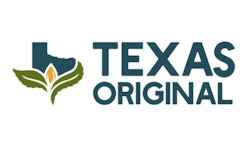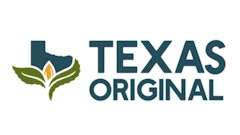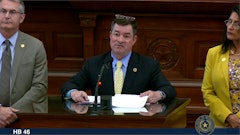
California Gov. Gavin Newsom vetoed a bill on Oct. 11 that had aimed to expand patient access to medical cannabis in the nation’s oldest legalized marketplace.
The legislation, Assembly Bill 1332, would have allowed licensed microbusinesses to ship medical cannabis directly to patients in California using a common courier, such as UPS or FedEx, under limited circumstances. The bill was intended to allow patients who can’t travel or don’t travel well to purchase products that aren’t stocked in their local dispensaries.
Sponsored by Assemblymember Patrick Ahrens, D-Silicon Valley, A.B. 1332 passed unanimously in both the Senate, 39-0, and House, 78-0, last month before arriving on Newsom’s desk.
“While I appreciate the author’s goal of expanding patient access to medical cannabis, the proposed direct-shipping program would be burdensome and overly complex to administer,” Newsom said in his veto statement. “The Department of Cannabis Control (DCC) will need to revamp the California cannabis track-and-trace system, which will take significant resources and time. Moreover, this measure includes numerous restrictions on eligible products – many of which are unclear, overly narrow or unworkable, adding to the implementation challenge.”
According to a fiscal analysis of the bill from the Senate Appropriations Committee, the DCC reported a one-time implementation cost of approximately $269,000 to modify the track-and-trace system, and ongoing annual costs of $472,000 to oversee shipments and ensure compliance with product restrictions.
That annual cost represents less than 0.05% of what the state collected in taxable cannabis sales last year, according to the California Department of Tax and Fee Administration.
“Given that this measure allows just two businesses to ship medical cannabis directly to patients, the costs of administering this program far outweigh the possible benefits to patients,” Newsom said.
According to the bill, any microbusiness with an M-license whose licensed activities include retail sale, manufacturing, distribution, and outdoor cultivation may directly ship medicinal cannabis to a medicinal cannabis patient in the state.
According to the DCC, there are 290 active microbusiness licenses with a “medicinal” or an “adult-use and medicinal” license designation in California. Of these licensees, more than 50 check the vertical integration box for retail, manufacturing, distribution and cultivation.
The governor’s veto comes at a time when medical cannabis sales are on pace to dip below $200 million in 2025, representing roughly 4% of the licensed marketplace in California, according to the DCC. This compares to roughly $540 million in medical cannabis sales in 2021.
The sales dip comes after California was once hailed as the largest medical cannabis market in the nation, with a group of roughly 150 individuals on behalf of California’s cannabis trade, labor, advocacy, veterans and patient organizations estimating that the state had more than $2.5 billion in medical sales less than 10 years ago.”
That group signed a letter to Newsom and legislative leaders in late 2024, asking for patient equity in a state that fails to exempt medical patients from its 15% cannabis excise tax at retail.
“Prior to [adult-use] legalization, there were millions of California patients with doctor’s recommendations, achieving over $2.5B in medical sales in 2017,” the signers wrote. “Post legalization, due to unbearably high taxes, medical cannabis patients have been forced to seek their medicine in the unregulated market, where untested products have already been a proven danger to their health.”
In addition to receiving a doctor’s recommendation, California’s medical cannabis patients must obtain a Medical Marijuana Identification Card (MMIC) through their local county health departments to be exempt from the state’s sales-and-use tax. Depending on the county, these MMICs can cost upward of $200.
RELATED: Special Report: The Downfall of Medical Cannabis in 17 Adult-Use Markets
While California voters were the first to legalize medical cannabis in the U.S. via Proposition 215 in the 1996 election, medical dispensaries were left to operate in a legal gray area for more than two decades. The state didn’t regulate commercial operations until after California lawmakers passed the Medicinal and Adult-Use Cannabis Regulation and Safety Act (MAUCRSA) to consolidate both industry segments following voter approval of Prop. 64 in 2016.
Despite MAUCRSA’s implementation, 57% of California cities and counties still prohibit cannabis dispensaries, according to the DCC, leaving vast regions unserved.
In 2022, the California Legislature passed legislation requiring all cities and counties to provide medical cannabis access through brick-and-mortar dispensaries or delivery services.
However, proponents of now-vetoed A.B. 1332 argued that a small population of patients still seek products that their local dispensaries or cannabis delivery services simply don’t keep in stock because they’re perishable and aren’t in high demand.
In sponsoring the bill, Ahrens called it a problem of prioritizing adult-use products over medicinal formulations.
“As a result, many patients – particularly those with intractable epilepsy, advanced cancers, multiple sclerosis and neurodegenerative disorders – are struggling to obtain appropriate and effective medical cannabis products,” he said in an author’s comment on the bill. “California’s vast geography further exacerbates this issue, as many seriously ill patients live in areas where specialized medical cannabis products are not available locally and these patients are not able to travel long distances to dispensaries that carry the products they need.”
Two decades ago, when California’s medical cannabis patient demand was shaping the nation, products tailored to specific conditions were more readily available and accessible, according to Dr. Laurie Vollen, a licensed board-certified physician in clinical preventive medicine.
Vollen testified in favor of A.B. 1332 in April before the California Assembly Business and Professions Committee, telling the body’s members that the state’s cannabis patients “have become orphans” and that shipments via common couriers are now needed.
“It might seem counterintuitive to today’s California Legislature, but 29 years after medicinal marijuana was legalized in California, medicinal products have become virtually extinct in today’s cannabis marketplace,” she said. “Long-term patients cannot find any of the products that they were using effectively five years ago. No dispensary or delivery service has a full complement of medicinal products suitable for serving the needs of a variety of cannabis patients, especially cannabis-naive patients desperately seeking to begin alternatives to dangerous and addictive pharmaceuticals.”
The legislation had intended to limit product shipments to cannabis flower and tinctures manufactured with non-volatile solvents, mechanical extraction or infusion only, such as food-oil infusion tinctures.
In his veto statement, Newsom said he remains open to working with state lawmakers to adopt strategies to effectively advance equitable access to safe medical cannabis. “However, this measure would not achieve that goal,” he said.
The Society for Cannabis Physicians, which sponsored the bill, disagrees.
“This bill is a crucial step toward ensuring that patients with severe and complex medical conditions can access the medicine they need,” the society wrote in support of the bill. “Since the implementation of Proposition 64 in 2018, the availability of medical cannabis products has declined significantly due to regulatory burdens, high taxation and the prioritization of adult-use products over medicinal formulations.”
Ahrens had included a three-year sunset provision in A.B. 1332 in an effort to allow lawmakers to revisit its effectiveness.



























